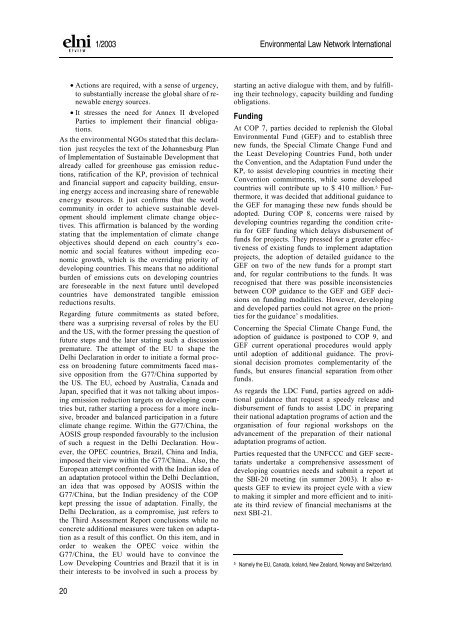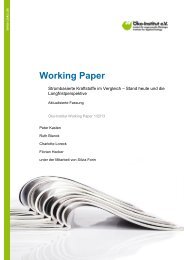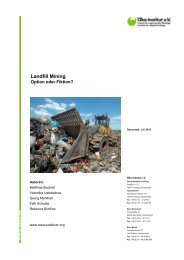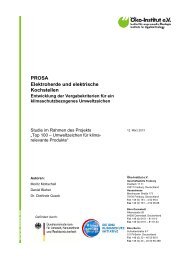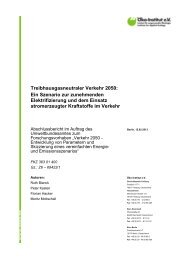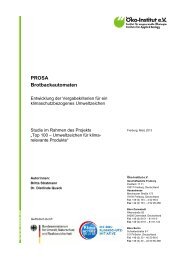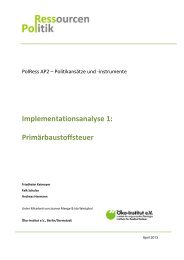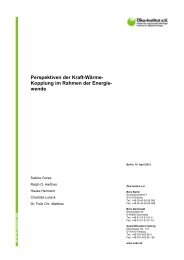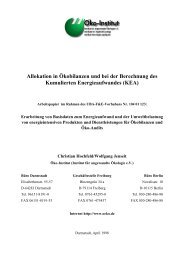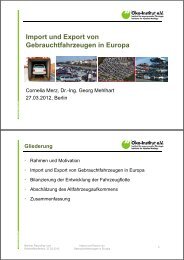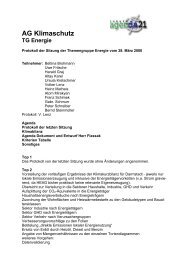elni NEWS - Öko-Institut eV
elni NEWS - Öko-Institut eV
elni NEWS - Öko-Institut eV
Create successful ePaper yourself
Turn your PDF publications into a flip-book with our unique Google optimized e-Paper software.
20<br />
1/2003 Environmental Law Network International<br />
• Actions are required, with a sense of urgency,<br />
to substantially increase the global share of renewable<br />
energy sources.<br />
• It stresses the need for Annex II developed<br />
Parties to implement their financial obligations.<br />
As the environmental NGOs stated that this declaration<br />
just recycles the text of the Johannesburg Plan<br />
of Implementation of Sustainable Development that<br />
already called for greenhouse gas emission reductions,<br />
ratification of the KP, provision of technical<br />
and financial support and capacity building, ensuring<br />
energy access and increasing share of renewable<br />
energy resources. It just confirms that the world<br />
community in order to achieve sustainable development<br />
should implement climate change objectives.<br />
This affirmation is balanced by the wording<br />
stating that the implementation of climate change<br />
objectives should depend on each country’s economic<br />
and social features without impeding economic<br />
growth, which is the overriding priority of<br />
developing countries. This means that no additional<br />
burden of emissions cuts on developing countries<br />
are foreseeable in the next future until developed<br />
countries have demonstrated tangible emission<br />
reductions results.<br />
Regarding future commitments as stated before,<br />
there was a surprising reversal of roles by the EU<br />
and the US, with the former pressing the question of<br />
future steps and the later stating such a discussion<br />
premature. The attempt of the EU to shape the<br />
Delhi Declaration in order to initiate a formal process<br />
on broadening future commitments faced massive<br />
opposition from the G77/China supported by<br />
the US. The EU, echoed by Australia, Canada and<br />
Japan, specified that it was not talking about imposing<br />
emission reduction targets on developing countries<br />
but, rather starting a process for a more inclusive,<br />
broader and balanced participation in a future<br />
climate change regime. Within the G77/China, the<br />
AOSIS group responded favourably to the inclusion<br />
of such a request in the Delhi Declaration. However,<br />
the OPEC countries, Brazil, China and India,<br />
imposed their view within the G77/China.. Also, the<br />
European attempt confronted with the Indian idea of<br />
an adaptation protocol within the Delhi Declaration,<br />
an idea that was opposed by AOSIS within the<br />
G77/China, but the Indian presidency of the COP<br />
kept pressing the issue of adaptation. Finally, the<br />
Delhi Declaration, as a compromise, just refers to<br />
the Third Assessment Report conclusions while no<br />
concrete additional measures were taken on adaptation<br />
as a result of this conflict. On this item, and in<br />
order to weaken the OPEC voice within the<br />
G77/China, the EU would have to convince the<br />
Low Developing Countries and Brazil that it is in<br />
their interests to be involved in such a process by<br />
starting an active dialogue with them, and by fulfilling<br />
their technology, capacity building and funding<br />
obligations.<br />
Funding<br />
At COP 7, parties decided to replenish the Global<br />
Environmental Fund (GEF) and to establish three<br />
new funds, the Special Climate Change Fund and<br />
the Least Developing Countries Fund, both under<br />
the Convention, and the Adaptation Fund under the<br />
KP, to assist developing countries in meeting their<br />
Convention commitments, while some developed<br />
countries will contribute up to $ 410 million. 5 Furthermore,<br />
it was decided that additional guidance to<br />
the GEF for managing these new funds should be<br />
adopted. During COP 8, concerns were raised by<br />
developing countries regarding the condition criteria<br />
for GEF funding which delays disbursement of<br />
funds for projects. They pressed for a greater effectiveness<br />
of existing funds to implement adaptation<br />
projects, the adoption of detailed guidance to the<br />
GEF on two of the new funds for a prompt start<br />
and, for regular contributions to the funds. It was<br />
recognised that there was possible inconsistencies<br />
between COP guidance to the GEF and GEF decisions<br />
on funding modalities. However, developing<br />
and developed parties could not agree on the priorities<br />
for the guidance’ s modalities.<br />
Concerning the Special Climate Change Fund, the<br />
adoption of guidance is postponed to COP 9, and<br />
GEF current operational procedures would apply<br />
until adoption of additional guidance. The provisional<br />
decision promotes complementarity of the<br />
funds, but ensures financial separation from other<br />
funds.<br />
As regards the LDC Fund, parties agreed on additional<br />
guidance that request a speedy release and<br />
disbursement of funds to assist LDC in preparing<br />
their national adaptation programs of action and the<br />
organisation of four regional workshops on the<br />
advancement of the preparation of their national<br />
adaptation programs of action.<br />
Parties requested that the UNFCCC and GEF secretariats<br />
undertake a comprehensive assessment of<br />
developing countries needs and submit a report at<br />
the SBI-20 meeting (in summer 2003). It also requests<br />
GEF to review its project cycle with a view<br />
to making it simpler and more efficient and to initiate<br />
its third review of financial mechanisms at the<br />
next SBI-21.<br />
5 Namely the EU, Canada, Iceland, New Zealand, Norway and Switzerland.


